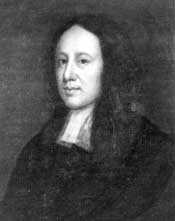Robert Thoroton

Dr. Robert Thoroton (4 October 1623 – c. 21 November 1678) was an English antiquary, mainly remembered for his county history, The Antiquities of Nottinghamshire (1677).
Life
He belonged to an old Nottinghamshire family, which took its name from Thoroton, near Newark. He resided mainly at another village in the same neighborhood, Car Colston, where he practised as a physician and where he lived the life of a country gentleman. He took very little part in the Civil War, although his sympathies were with the royalists, but as a magistrate he was very active in taking proceedings against the Quakers.
In 1667 Thoroton, aided by a band of helpers, began to work upon his great county history, The Antiquities of Nottinghamshire. This was published in London in 1677; it was dedicated to the eminent antiquarian William Dugdale and was illustrated by engravings by W. Hollar. It was Dugdale who had urged Thoroton to complete the work of history begun by Thoroton's father-in-law.[1]
Preparing for his death, Dr. Robert Thoroton had ordered made, some six years before his death, an elaborate carved stone coffin with the various heraldic shields of his ancestors incised upon it.[2] He was buried in the coffin,[3] but during restoration work on the chancel of St. Mary's Church in Car Colston in 1845, Thoroton's stone coffin was unearthed. The coffin, made of red Mansfield stone, was opened and Dr. Thoroton's skull was removed and placed in a shop in the village as a 'curiosity.'[4] The vandalism was subsequently discovered, and the local vicar ordered the remains to be collected, replaced within the coffin and reinterred.[5]

In 1797 a new edition of the Antiquities was published by John Throsby (1740–1803), who added an additional volume.
Legacy
In 1897 the Thoroton Society of Nottinghamshire was founded in honour of the antiquarian, its object being to promote the study of the history and antiquities of Nottinghamshire. Under its auspices annual volumes of Transactions and several volumes of Records have been published, and much valuable work has been done.
A brass tablet to the memory of Thoroton has been placed in Car Colston church.[6]
Myles Hildyard Thoroton, a descendant of the family who lived at Flintham Hall, Flintham, and a descendant of Robert Thoroton's brother and heir, was president of the Thoroton Society for many years until his death in 2005.[7]
See also
References
- ↑ The Antiquities of Nottinghamshire, Extracted out of Records, Original Evidences, Leiger-Books, Other Manuscripts, and Authentic Authorities, Robert Thoroton, Doctor of Physic, printed by Robert White, London, 1677
- ↑ Transactions of the Thoroton Society of Nottinghamshire, Vol. 5, Thoroton Society, John Standish, George Fellows, W.B. Cooke, Nottingham, 1902
- ↑ Photo of Robert Thoroton's Coffin, Car Colston St Mary, SouthwellChurches, southwellchurches.nottingham.acuk
- ↑ Photo of Robert Thoroton's coffin, Car Colston St Mary, SouthwellChurches, southwellchurches.nottingham.ac.uk
- ↑ News for Spring 2005, The Thoroton Society of Nottinghamshire, thorotonsociety.org.uk
- ↑ Illustration of brass tablet to Dr. Robert Thoroton, Car-Colston Church, Nottinghamshire History, nottshistory.org.uk
- ↑ From its beginnings at Car Colston, the Thoroton family later purchased Screveton Hall at nearby Screveton, where they lived until purchasing Flintham Hall at Flintham -- and changing their name to Hildyard on marriage with an heiress of Hildyard of Winestead. Screveton Hall has since been demolished, and the heir of longtime Thoroton Society president Myles Thoroton Hildyard lives today at Flintham Hall.
![]() This article incorporates text from a publication now in the public domain: Chisholm, Hugh, ed. (1911). Encyclopædia Britannica (11th ed.). Cambridge University Press
This article incorporates text from a publication now in the public domain: Chisholm, Hugh, ed. (1911). Encyclopædia Britannica (11th ed.). Cambridge University Press
Further reading
- The Antiquities of Nottinghamshire, Extracted out of Records, Original Evidences, Leiger-Books, Other Manuscripts, and Authentic Authorities, Robert Thoroton, Doctor of Physic, printed by Robert White, London, 1677
- Thoroton, Robert. History of Nottinghamshire. John Throsby. pp. 242–245.
External links
- Photograph of Tombstone of Robert Thoroton, Car Colston St Mary Church, southwellchurches.nottingham.ac.uk
- Photograph of Thoroton Tablet on Southeast Buttress of St Mary Church, Car Colston, Nottinghamshire, southwellchurches.nottingham.ac.uk
 "Thoroton, Robert". Dictionary of National Biography. London: Smith, Elder & Co. 1885–1900.
"Thoroton, Robert". Dictionary of National Biography. London: Smith, Elder & Co. 1885–1900. - The Thoroton Society of Nottinghamshire
|